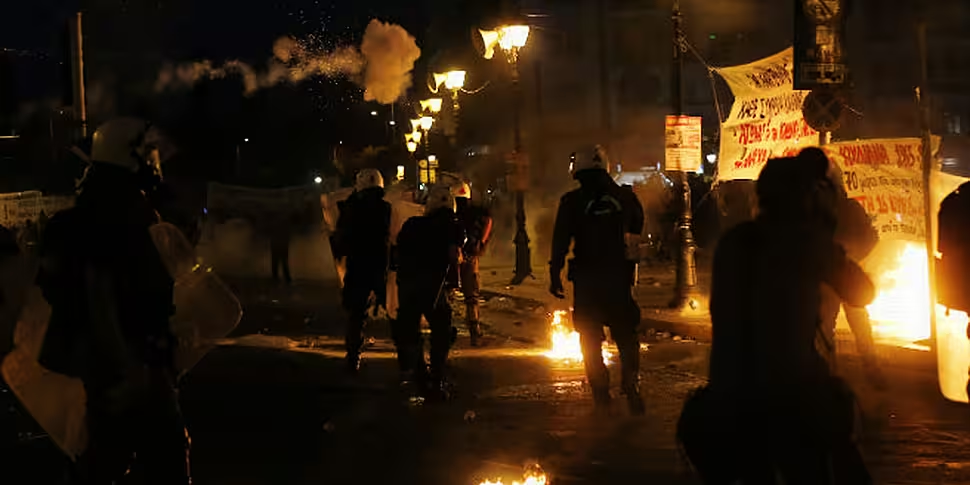Riot police have released several rounds of tear gas at protesters outside the Greek parliament.
Greek MPs will vote tonight on legislation in parliament designed to keep them in the euro and secure critical funding to save it from bankruptcy.
Over 1,000 protesters have gathered in Syntagma Square, urging politicians to vote no.
Newstalk.com reporter Shona Murray is there:
Standoff at #Syntagma right now pic.twitter.com/7OphpLtLo7
— Shona Murray (@ShonaMurrayNT) July 15, 2015
Riot police disperse crowd at #Syntagma now. Several rounds of tear gas emitted #OXI pic.twitter.com/Huuj40TVlM
— Shona Murray (@ShonaMurrayNT) July 15, 2015
Demonstrators threw petrol bombs at riot officers outside the Greek parliament as politicians discussed a key bill that has to pass in order to start negotiations with creditors on a third bailout.
Thousands of anti-austerity demonstrators have marched through the centre of the city and civil servants protested with a 24-hour strike that disrupted public transport
There were also angry scenes in the Parliament of the Hellenes as deputies discussed approving a new series of laws in order to win a bailout worth €86bn.
Greek Prime Minister Alexis Tsipras agreed a deal on Monday morning after all-night talks with eurozone leaders aimed at stopping the country plunging out of the euro.
Measures being put to parliament, which are just the first of a number of laws that will have to be passed before the bailout will be fully approved, include:
- An increase in VAT on all goods and services.
- Ending the VAT reduction for the Greek islands and a series of other tax rises.
- A cut in pensions.
- Making the Greek statistics office independent and introducing a mechanism that automatically restrains spending if it gets too high.
One deputy ripped up his parliamentary papers in disgust and threw them across the chamber.
Shortly before, the deputy finance minister Nadia Valavani resigned from Mr Tsipras' government in protest.
IMF warning
The vote comes after one of Greece's major creditors cast doubt over whether the overall package of measures - which includes a foreign takeover of state-owned businesses - would be enough to ensure the country recovers.
The International Monetary Fund (IMF) said Greece has taken on too much debt and will be unable to keep up its repayments even after the new deal.
It said Greece's debts will peak at 200% of the country's economic output in the next two years.
The body said the only way Athens could emerge from the crisis is if some of its debts are restructured - possibly by extending the period of repayment or even by writing off some of them.
It has since emerged that the eurozone looked at debt restructuring, but ruled out write offs.
Germany, which was key to the deal being struck, kept to its stance that the approach taken by the eurozone will work, as it has elsewhere.
Mr Tsipras is facing a revolt from several members of his party, upset that the bailout depends on painful tax hikes and pension cuts.
However Mr Tsipras has said Syriza members who abstain from voting will not be disciplined.
The bailout measures bill is expected to pass, but only with support from opposition parties.
It comes as several sections of the workforce went on strike and two separate groups of citizens held protests against the measures.
Greece's finance ministry said the banks - which have been shut since 29 June - would remain closed until at least Thursday, but some would open to allow payments to the state.
In order to become law, the vote has to be passed by midnight Greek time, 10pm Irish time.
'Blackmail'
Yesterday, the Greek prime minister has described the bailout deal with European creditors as "blackmail", and warned it could be some time before banks fully reopen.
In his first televised interview since returning from talks in Brussels, Alexis Tsipras said he does not believe in the agreement but is obliged to implement it.
Mr Tsipras argued that if he did not agree to the package of reforms demanded by Europe, Greece would have gone bankrupt and exited the Euro.
"The hard truth is this one-way street for Greece was imposed on us," he said.
"The policies imposed on us were irrational. We faced a tough and punitive position from our partners... but the (agreement) does offer a way out of the crisis."
Mr Tsipras says ultimately, he will take the rap.
Asked when Greece's banks would reopen, Mr Tsipras said: "When banks open depends on when we have the final ratification of the agreement."
However, he said there would be a gradual return to normality, starting with an increase in the withdrawal limit.
Despite the open revolt within his own government and party, Mr Tsipras said he would not step down and would not call an early election.
"The worst thing a captain can do while he is steering a ship during a storm, as difficult as it is, is to abandon the helm," he said.









